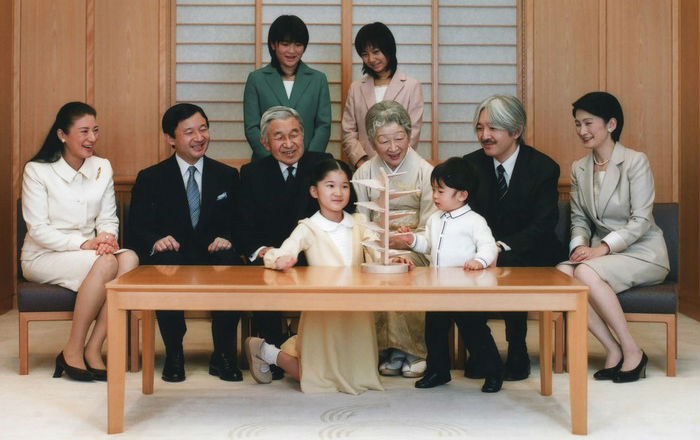 With handshakes from one last group of dignitaries, Japan’s Emperor Akihito and Empress Michiko left Ottawa Wednesday afternoon, concluding their six-day visit in the capital. They boarded their official government 747 bound for Toronto, to continue their 11-day goodwill tour to celebrate the 80th anniversary of diplomatic relations between Canada and Japan.
With handshakes from one last group of dignitaries, Japan’s Emperor Akihito and Empress Michiko left Ottawa Wednesday afternoon, concluding their six-day visit in the capital. They boarded their official government 747 bound for Toronto, to continue their 11-day goodwill tour to celebrate the 80th anniversary of diplomatic relations between Canada and Japan.
This is part of an email sent to me by one of my students which I though was an interesting observation and may be of interest to our readers.
“Good Afternoon Sensei,
I just wanted to pass something on to you that I thought may be of interest. I recently had the honour of viewing parts of the Imperial visit of the Emperor and Empress of Japan. I was able to see the Emperor and Empress on a few different occasions such as the Sick Kids Hospital, Queen’s Park, and the Japanese Cultural Center. I wanted to share my thoughts with you about the Emperor and Empress since I believe we may all learn significantly from the Royal Family in terms of their humanitarian efforts, their daily life, and the rich culture and history of Japan of which they are a living expression.
At the Sick Kids Hospital in Toronto, the Emperor and Empress visited many different areas. I observed them interact with some children in the library reading room of Sick Kids Hospital for about a half an hour. They spent time talking to children that were patients of the hospital. They were genuine and compassionate in their time with these children and they took time to speak to many children. I thought it was wonderful that they took time with these children; some of whom suffer from very tragic physical and mental conditions, and struggle substantially on a daily basis. I felt the Empress was moved by these kids and she sang a song for the children in the reading room. It was a nice and special time for the children and for all of us to share.
At the Japanese Cultural Centre I was able to see and learn much about the Imperial Couple. I was also early and was able to watch a video that was showing on a large screen in the same room where we held our Takai. The room was decorated nicely for the reception of the Emperor and Empress. I was able to watch a video documenting some periods in the life of the Emperor and Empress. I’ll try to break this video down into specific themes.
Based on this brief documentary, it was clear that the Emperor is a highly educated, studious and learned man. The video showed a section of the Emperor’s library housing books on Okinawan history, culture, and traditions of which there were several (roughly forty or so and I’m being conservative in my estimate). The documentary spoke of the Emperor’s desire to learn as much about Okinawa and its people. The documentary spoke of the Japanese military’s campaigns and conduct in Okinawa during WWII and the effect this had on the Okinawan people and their ‘complex’ feelings towards the Emperor. I believe the Emperor understands this very well based on his studies and contact with the people. I believe the Emperor has had a sincere desire to learn of their suffering and I think I remember the Emperor stating in the documentary that he acknowledges the suffering incurred by many people at the hands of the Japanese army in WWII and that he deplores acts of inhumanity. I don’t want to offer many opinions but I do believe the Emperor to be a sincere humanitarian and a man of deep spiritual conviction. I observed him speak openly about the past tragedies inflicted by the Japanese (such as against the Chinese and the Dutch in front of official representatives of both nations), and I believe that he does so freely of his own volition in order to acknowledge and atone for his nation’s past.
I also learned about his spiritual side. There is a time (once a year) where the Emperor performs a ceremony where he must kneel in a temple for several hours (I can’t remember the exact amount). The video stated the Emperor observes this ceremony with the utmost respect and serious consideration; for it is one in which he prays for the well-being of the Japanese people as a whole. I remember the documentary stating that the Emperor’s reverence for the gods causes him to remain completely focused during the hours of his prayer service; and that he prepares for this time throughout the year prior to the occasion.
I also observed the Royal Couple in the natural landscape of their nation. They were able to recognize many different kinds of trees, birds, and flowers by name. I would think that they make time to enjoy the natural beauty of the world and to learn as much as they can about nature. I think that the Emperor and Empress are also no stranger to manual labour, since he and the Empress have a garden in which they grow their own rice, herbs, and vegetables. I was able to see them working in the garden and preparing some of the crops.
hope I was able to pass on something enlightning about such interesting and exceptional people from a part of the world which has offered us the richness of our Art to you Sensei.
Take Care Sensei”

Good article. Very well written
In truth, immediately i didn’t understand the essence. But after re-reading all at once became clear.